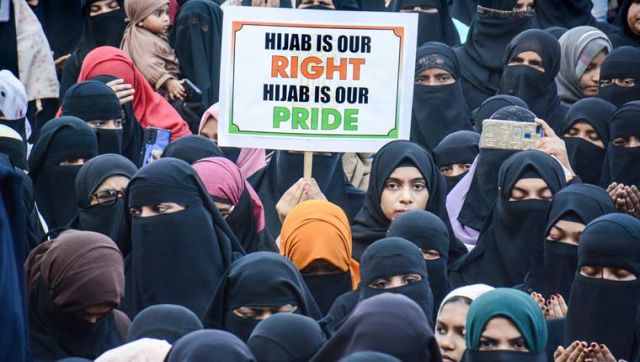Just as the Karnataka High Court on Tuesday ruled that wearing hijab is not an essential religious practice while backing a ban on religious clothing in educational institutions, eight burqa-clad students in a Karnataka district were not allowed to appear for the exam. The HC dismissed a number of petitions challenging a ban on headscarves in the state. The court was hearing writ petitions filed by Muslim students seeking permission to wear hijab in classrooms. “We are of the considered opinion that the prescription of a school uniform is a reasonable restriction constitutionally permissible which the students cannot object to,” the full bench comprising Karnataka chief justice Ritu Raj Awasthi, Justice Krishna S Dixit, and Justice J M Khazi. Also read: Karnataka hijab row: Explaining how the controversy erupted and what’s next for student protesters The order comes as a big blow to Muslim girls and women attending schools and colleges in the state. Thousands took to the streets after the hijab controversy stoked protests in January, which spread to other parts of the country, and forced authorities in Karnataka to keep educational institutions closed. After two-year long lockdown imposed to curb the spread of COVID-19, the more than two-month long controversy has affected education of students in Karnataka. Let’s take a look at what is the hijab ban controversy and how it has affected Muslim students: What is the hijab ban controversy It all started with a protest by a group of six girls in Udupi, who were denied permission to wear hijab in the classroom in December last year. On 1 January 2022, the students of Udupi Women’s PU College held a press conference and criticised the ban. Soon after, Udupi BJP MLA Raghupati Bhat, also the college’s development committee head, met with the students and parents and requested them to follow the college dress code. However, the girls were not ready to budge. They continued the demonstration and stood outside the classroom for three days and later approached the court. Soon reports started emerging from other educational institutions as they imposed similar curbs. More and more writ petitions filed in the Karnataka High Court by Muslim students, seeking the right to wear the hijab. The protests intensified and spread to other parts of the state, as videos emerged of young girls wearing hijab being heckled by crowds of men sporting saffron scarves. The rising tensions led to suspension of classes in several colleges in Vijayapura, Koppa, Mangaluru, Kundapura and Udupi.
When Muslim girl arrives at PES College, She's been heckled by several 'students' wearing #saffronshawls #KarnatakaHijabRow pic.twitter.com/qa3UDbMPST
— Mohammed Zubair (@zoo_bear) February 8, 2022
A full bench of the Karnataka High Court passed an interim order on 10 February that restrained students from wearing the hijab, saffron scarves, shawls, or religious flags within the classroom until the final order was delivered. How the Muslim students have been affected According to a report by NDTV, eight students wearing hijabs were turned away from their exam centre on Tuesday. The students had come to Kembhavi village PU college in Yadgir district of Karnataka to take their second PU preparatory examinations. Before the High Court’s interim ban, this college allowed the students to wear the hijab inside classrooms, the report noted. The eight students had taken the exams on Monday without a hijab but refused to remove them today. “The college earlier allowed hijab but we were simply following the High Court’s interim order. We tried to convince the students not to wear the hijab. They abided by that. But today, they refused to remove it and take their exams,” Chandrakanth J Halli, Yadgir district Deputy Director of the Department of Pre-University, said. According to a report by The News Minute, data compiled by the Muslim Okkoota, a coalition of organisations representing Muslim community in Udupi, showed that at least 230 Muslim girls from Udupi have missed classes and examinations this month. More students in Chikkamagaluru, Shivamogga, Dakshina Kannada and Uttara Kannada, also find themselves in the same situation due to the hijab ban. The six students who had filed the first petition are also among the 230 students. However, the total number of students who have missed classes and exams could be much higher. “Around 230 is the number of students who have come forward and enrolled for online classes. There are students in other districts who have missed their classes. There are also some parents who are asking why students should study when they won’t be allowed to write the examinations,” Hasan Maved, a member of the Muslim Okkoota in Udupi says, as quoted by The News Minute. With inputs from agencies Read all the Latest News , Trending News , Cricket News , Bollywood News , India News and Entertainment News here. Follow us on Facebook, Twitter and Instagram.


)

)
)
)
)
)
)
)
)



